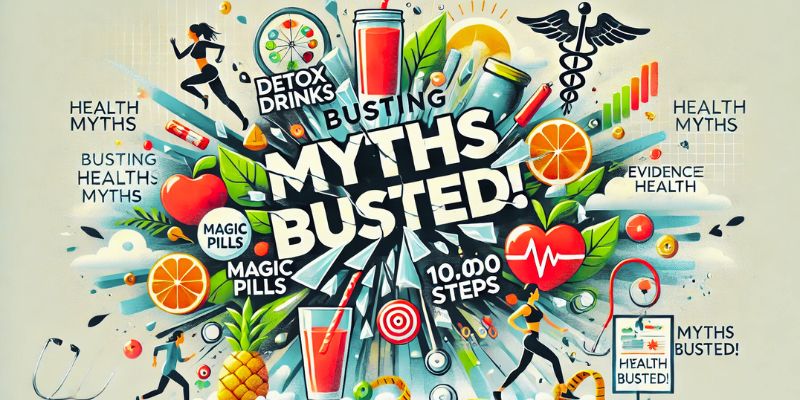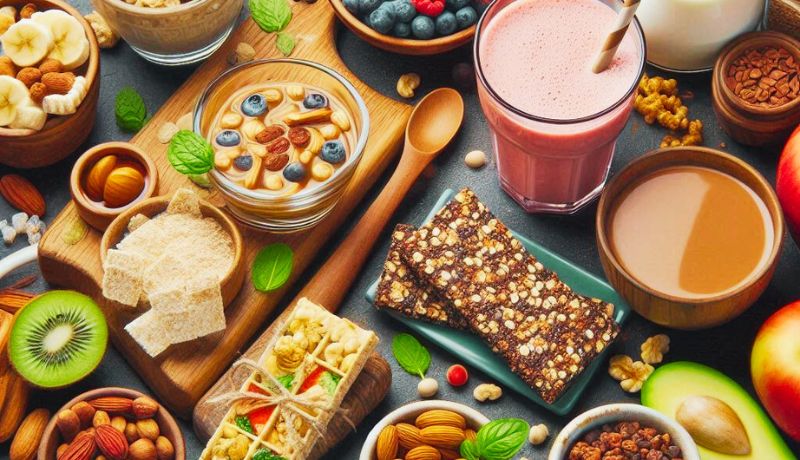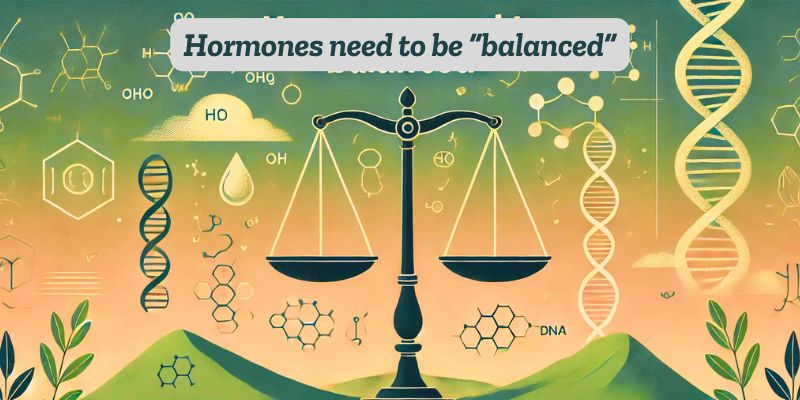
In a world overflowing with health advice, it’s often difficult to separate fact from fiction.
Many popular health myths can not only affect your well-being but also drain your wallet.
In this post, we’ll bust some of the most common misconceptions, helping you make smarter, evidence-based choices for both your health and finances.
1. Breakfast Is the Most Important Meal of the Day
Myth: Skipping breakfast is harmful to your health.
Truth: It depends on your individual needs.
For some people, skipping breakfast as part of an intermittent fasting routine can support weight loss, improve insulin sensitivity, and promote metabolic flexibility. For others, breakfast might be essential to maintain energy and focus throughout the day.
The key is understanding your body’s needs and eating habits that align with your lifestyle and goals.
How This Saves You Money
By denying the belief that breakfast is mandatory, you can save money on groceries, particularly on pre-packaged breakfast items or expensive “healthy” breakfast products.
If you don’t feel hungry in the morning, there’s no need to force a meal. This allows you to allocate your budget to other nutritious options later in the day.

2. You Need 8 Glasses of Water Per Day
Myth: Everyone needs exactly 8 glasses of water daily.
Truth: Hydration needs vary greatly based on individual factors like body size, physical activity, environment, and even diet.
While the “8 glasses a day” rule offers a general guideline, the best approach is to listen to your thirst and observe how your body responds. Foods like fruits and vegetables also contribute to your daily water intake, making the fixed number less critical.
How This Saves You Money
By recognizing that hydration doesn’t require expensive bottled water, hydration supplements, or overconsumption, you can rely on cost-effective alternatives like tap water.
This not only reduces your expenses but also minimizes waste, offering both financial and environmental benefits.
3. You Need to Poop Daily
Myth: Missing a day means your body isn’t functioning properly.
Truth: Bowel habits vary widely among individuals. Some people naturally go multiple times a day, while others may go every couple of days.
This variation is normal and often influenced by factors such as diet, hydration, stress levels, and physical activity. As long as you feel comfortable and aren’t experiencing pain or other symptoms like bloating or straining, it’s perfectly healthy to occasionally skip a day.
Maintaining a balanced diet rich in fiber from fruits, vegetables, legumes, and whole grains, alongside staying hydrated, supports overall digestive health.
How This Saves You Money
By understanding that occasional irregularity is natural, you can avoid spending on unnecessary laxatives, fiber supplements, or marketed products promising “regularity.”
Instead, investing in nutrient-rich, whole foods not only supports your digestive system but also provides overall health benefits without the extra costs.
4. Certain Health Foods Are Not Actually Healthy
Myth: Foods like oatmeal, seed oils, and smoothies are bad for you.
Truth: Oatmeal is a versatile and affordable breakfast option, packed with fiber and whole grains that promote heart health, stable blood sugar, and digestion.
Seed oils, including sunflower and canola, contain beneficial omega-6 fatty acids that support overall health when consumed in moderation, despite their occasional bad reputation.
Smoothies, on the other hand, can be nutritional powerhouses when made with a thoughtful combination of ingredients like fruits, vegetables, protein sources, and healthy fats, offering a convenient way to meet daily nutrient goals.

How This Saves You Money
Embracing these readily available and cost-effective foods can help you avoid the trap of expensive “superfoods” or trendy health alternatives.
Oatmeal, for instance, costs just a fraction of processed breakfast options while providing sustained energy.
Likewise, using seed oils wisely eliminates the need to splurge on pricier cooking oils, and homemade smoothies can be tailored to your budget, saving you money compared to pre-packaged or store-bought versions.
5. Eggs Are Bad for You
Myth: Eggs raise cholesterol and increase cardiovascular risk.
Truth: For years, eggs were demonized due to their cholesterol content, but extensive research now shows no clear link between dietary cholesterol and heart disease in most individuals.
Eggs are a nutritional powerhouse, providing high-quality protein, essential vitamins (like B12 and D), and minerals such as selenium and choline. Consuming 2–3 eggs per day is generally safe for most people and can support muscle building, brain health, and energy production.
How This Saves You Money
Eggs are one of the most affordable sources of high-quality protein available. They cost significantly less than many protein alternatives like meat, fish, or protein powders.
By incorporating eggs into your meals, you can stretch your grocery budget while enjoying versatile and nutritious dishes like omelets, salads, or frittatas. Additionally, skipping processed egg substitutes or “cholesterol-free” alternatives saves you even more.

6. Walk 10,000 Steps a Day to Lose Weight
Myth: Walking 10,000 steps daily is a universal weight-loss solution.
Truth: While 10,000 steps are an excellent activity goal, weight loss is more complex and involves multiple factors.
While walking can improve cardiovascular health and maintain mobility, sustainable weight loss typically requires a holistic approach, including strength training, high-intensity exercises, mindful eating, and maintaining a calorie deficit.
Customizing your activity levels to your lifestyle and fitness goals is key rather than sticking to arbitrary benchmarks.
How This Saves You Money
Instead of purchasing expensive fitness trackers or subscribing to programs that heavily market the 10,000-step rule, you can save money by focusing on personalized, cost-effective fitness routines that combine diverse exercise forms.
Investing in activities you enjoy, such as cycling or group classes, might be more beneficial and motivating in the long term.

7. Daily Vitamins Are Pointless
Myth: Multivitamins have no real benefit.
Truth: Multivitamins are not a substitute for a varied, healthy diet, but they can play an important role in filling nutritional gaps.
Many people are deficient in nutrients like vitamin D, magnesium, and iron due to dietary limitations or lifestyle factors. Multivitamins provide an affordable, convenient way to ensure you meet your daily needs, especially for those with busy schedules or restricted diets.
However, it’s essential to choose products backed by reputable standards rather than falling for overpriced or poorly regulated options.
How This Saves You Money
Instead of buying a wide range of individual supplements, which can add up quickly, a single multivitamin can cost-effectively address multiple deficiencies.
Additionally, you avoid wasting money on supplements you don’t need by consulting a healthcare provider to determine your specific requirements.
8. Sugar Gives You a “Rush”
Myth: Sugar provides an instant energy boost.
Truth: Sugar consumption can temporarily elevate blood sugar levels, providing a brief feeling of increased energy.
However, this is often followed by a “crash,” leading to fatigue and decreased productivity. Instead, focus on healthier alternatives like consuming protein-rich snacks, and complex carbohydrates, or engaging in a short walk for natural energy boosts.
How This Saves You Money
By cutting back on sugary snacks and energy drinks, which are often expensive and habit-forming, you can reduce unnecessary spending and rely on cost-effective, nutrient-dense foods to sustain your energy.

9. Going Out in the Cold Can Make You Sick
Myth: Cold weather causes colds.
Truth: Colds are caused by viruses, not temperature.
While cold weather itself does not lead to illness, it can indirectly contribute to increased risk by encouraging people to stay indoors near others, where viruses spread more easily.
Getting fresh air or exercising outdoors in the cold can actually improve your mood, enhance circulation, and strengthen your overall health.
Dressing warmly and staying active can help you enjoy the benefits of outdoor activities even during colder months.
How This Saves You Money
By understanding that cold weather is not to blame for illness, you can avoid over-purchasing unnecessary cold remedies, immune-boosting supplements, or heating-related expenses to “stay healthy.”
Instead, focus on proven prevention methods like proper hygiene, nutritious eating, and staying active. Prioritizing these habits saves money and supports better long-term health outcomes.

10. Antiperspirants Cause Cancer
Myth: Chemicals in antiperspirants increase cancer risk.
Truth: There is no credible scientific evidence linking antiperspirants to cancer. These products primarily reduce moisture by temporarily blocking sweat glands using safe, tested ingredients such as aluminum compounds.
Regulatory authorities like the FDA and the American Cancer Society affirm their safety. Additionally, your body’s natural detox systems, including the liver and kidneys, work efficiently to eliminate toxins, making these fears unfounded.
How This Saves You Money
By understanding that mainstream antiperspirants are safe, you can skip overpriced “toxin-free” or “natural” deodorants marketed to capitalize on unwarranted fears.
Opt for budget-friendly, reliable options without compromising effectiveness or falling for marketing hype.
11. A Detox Diet Can “Flush Out” Toxins
Myth: Detox products and diets eliminate harmful toxins from your body.
Truth: Your body already has an incredibly effective detox system: your liver and kidneys. These organs work around the clock to filter and eliminate toxins and waste products.
Instead of relying on trendy detox teas, juices, or supplements, which often lack scientific backing, you can support your natural detoxification system by maintaining a healthy diet.
Eating foods rich in antioxidants, such as leafy greens, berries, and citrus fruits, alongside staying hydrated, helps your organs function optimally.
Regular physical activity and adequate sleep also play key roles in your body’s natural cleansing processes.
How This Saves You Money
Detox products and programs can cost hundreds of dollars, yet they offer no proven benefits beyond what your body does naturally.
By focusing on wholesome, affordable foods like fresh vegetables, fruits, and whole grains, you can nourish your body without falling for expensive fads.
Additionally, you’ll save money by avoiding unnecessary supplements and juices marketed as “miracle cleanses.”

12. Everyone Has ADHD
Myth: TikTok and social media videos suggest most people have ADHD.
Truth: ADHD is a complex neurodevelopmental disorder requiring professional evaluation for diagnosis. Social media platforms often oversimplify the condition, generalize its symptoms, and promote misinformation, which can lead to misidentification and unnecessary anxiety.
Genuine ADHD involves persistent patterns of inattention, hyperactivity, or impulsivity that interfere with daily life and are best assessed by a qualified healthcare professional.
How This Saves You Money
By avoiding self-diagnosis based on oversimplified social media content, you prevent unnecessary spending on unproven supplements, apps, or therapies.
Consulting a certified professional ensures proper care, saving money and avoiding ineffective or harmful treatments. Focus on evidence-based practices tailored to your unique situation.
13. You Cannot “Boost” Your Immune System
Myth: Turmeric cocktails or ginger shots can enhance your immunity.
Truth: While turmeric and ginger are healthy ingredients that may have anti-inflammatory and antioxidant properties, the idea that they can “boost” your immune system instantly is a misconception. Immunity is a complex system that cannot be quickly strengthened through specific foods or supplements.
Instead, building a resilient immune system requires consistent habits like prioritizing quality sleep, staying physically active, managing stress levels, and consuming a well-balanced diet rich in vitamins and minerals. These practices support overall health and help your body combat illness more effectively.
How This Saves You Money
By understanding that immunity can’t be “boosted” with expensive turmeric lattes, ginger shots, or other trendy products, you can save money and focus on affordable, proven strategies.
Nutrient-rich, budget-friendly staples like citrus fruits, leafy greens, and legumes provide immune support without the hefty price tag of marketed “superfoods.”
Additionally, skipping overpriced supplements leaves more room in your budget for wholesome meals and other essentials.
14. Food Sensitivities Are the Cause of Many Problems
Myth: DIY tests can identify food sensitivities causing your issues.
Truth: These tests are often unreliable and can result in incorrect conclusions, leading to unnecessary dietary restrictions that can harm your nutritional balance. Sensitivities are complex and vary from person to person.
Professional testing by a healthcare provider or registered dietitian is more accurate and tailored to your specific needs. Following guidance from trusted medical experts ensures you identify true triggers without undue sacrifice or worry.
How This Saves You Money
Avoid spending hundreds of dollars on unreliable tests that often recommend eliminating large groups of foods unnecessarily.
Instead, you can invest in balanced, affordable meals and consultations with a qualified healthcare professional who provides evidence-based advice, saving money in the long run while protecting your health.
15. Hormones Need to Be “Balanced”
Myth: Hormonal imbalances are the root cause of many health problems.
Truth: While hormonal fluctuations can sometimes cause health issues, not all variations are problematic. Hormones naturally change throughout life, influenced by factors like age, stress, and diet. Misdiagnosing or overreacting to minor fluctuations often leads to unnecessary interventions.
Instead of turning to unregulated “hormone-balancing” supplements or therapies, it’s crucial to consult with certified healthcare professionals who can provide accurate diagnoses and evidence-based treatments.
How This Saves You Money
Avoid spending hundreds of dollars on non-FDA-approved products and unproven therapies that exploit fears about hormonal imbalances.
Professional guidance ensures you receive appropriate care, reducing the risk of costly trial-and-error treatments.

Conclusion
Debunking health myths empowers you to take control of both your well-being and your finances.
The key is knowledge—by prioritizing evidence-based practices over trends, critically evaluating the sources of health information, and seeking professional advice rather than relying on self-diagnosis or hype, you make smarter, more sustainable choices.
Remember, health is a marathon, not a sprint. By investing in long-term habits that improve your physical health and protect your finances, you’re setting yourself up for lasting wellness and savings.
Stay informed, question myths, and make decisions that are aligned with your unique needs for a healthier, wealthier future.
But wait, imagine starting your own business that provides a full-time income while you stay at home and take care of your family. Join me on the leading online training platform that empowers anyone and everyone to build a profitable home-based business.

Hi!
You did an excellent job debunking common misconceptions that can mislead individuals and lead to unnecessary expenses.
For instance, you challenge the notion that everyone needs exactly 8 glasses of water daily, explaining that hydration needs vary based on individual factors like body size, activity level, and environment. Listening to your body’s thirst cues is indeed more effective than adhering to a fixed number.
Additionally, you address the myth that skipping breakfast is inherently harmful. You point out that for some, intermittent fasting (which often involves skipping breakfast) can support weight loss and improve metabolic health. The key is again to understand your body’s needs and choose eating patterns that align with your lifestyle.
By dispelling these myths, you empowers us to make informed decisions that promote both health and financial well-being.
My two cents
Fleeky
Hi Fleeky!
Thank you so much for your encouraging feedback! 🌟
I’m thrilled to hear that you found the post helpful in debunking common health myths that can lead to unnecessary expenses.
You’ve highlighted some key points beautifully. Indeed, hydration needs vary greatly among individuals, and paying attention to our body’s signals is indeed more effective than sticking to a rigid rule.
I’m glad you also mentioned the myth about skipping breakfast. Intermittent fasting can indeed be beneficial for many people when done thoughtfully and in alignment with one’s lifestyle and health goals.
I appreciate you sharing your thoughts and adding to the conversation. It’s all about empowering ourselves with knowledge to make informed decisions for both our health and finances.
Thank you again for your valuable insights, Fleeky! Looking forward to more engaging discussions with you. ✨